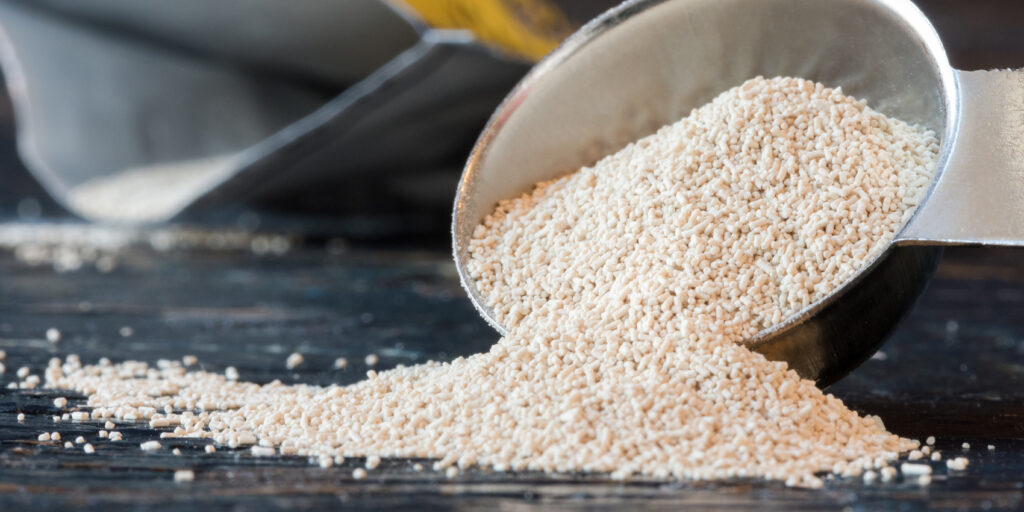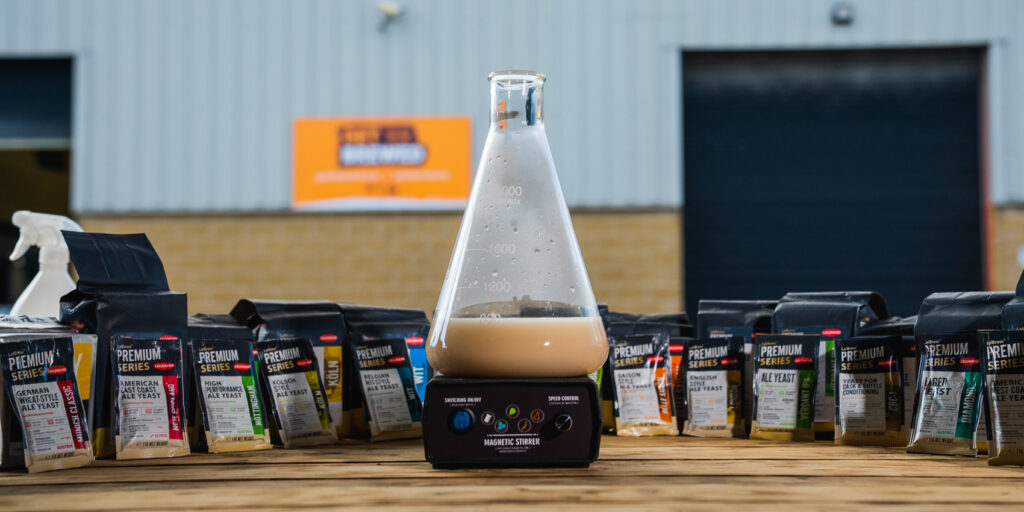From Good to Great: Achieving Optimal Yeast Growth Through Proper Yeast Nutrition
For brewers, the importance of nutrition in achieving optimal yeast growth cannot be overstated. Fermentation is crucial in brewing, and proper nutrition ensures the yeast performs optimally. Let’s explore how good nutrition helps to improve yeast growth and give tips on ensuring your beer is the best it can be. We’ll examine the importance of nutrition in fermentation and discuss how to provide the ideal nutrients for your yeast to achieve optimal growth. So, let’s dive in and learn how to take your homebrewing from good to great!

Understanding the role of Yeast Nutrition in fermentation
Proper nutrition is essential for yeast’s growth and metabolic activity in fermentation. One important aspect of yeast nutrition is the availability of free amino nitrogen (FAN). This refers to the concentration of amino acids and small peptides crucial for yeast metabolism. FAN levels can be determined using various analytical techniques such as spectrophotometry, enzymatic assays, and chromatography. We sell high-quality premium products at Geterbrewed, and the FAN levels can be easily seen in the Certificate of analysis for the malts we supply.
A minimum of 150 mg/L of FAN is ideal for standard beer fermentation. It affects fermentation parameters such as fermentation rate, attenuation, aroma, and yeast vitality. In addition to nitrogen, yeast requires various other nutrients, such as fermentation enzymes, vitamins, and minerals, for optimal growth and metabolism.
Brewers can influence FAN levels in beer through various techniques, such as selecting brewing grains and adjuncts or adding exogenous nutrients. One option for adding additional amino acids to the wort is to use the Geterbrewed range of products. Proper monitoring of yeast health through pH, gravity, and cell count measurements can help ensure that yeast receives the proper nutrition for successful fermentation.
The impact of cell counting your yeast culture
Nutrition is a critical aspect of yeast growth and fermentation. When yeast lacks essential nutrients, it can result in slower fermentation, stalled fermentation, off-flavours, and other unwanted outcomes. Therefore, monitoring yeast’s health and nutritional status during fermentation is crucial.
One way to do this is by using a hemocytometer to count yeast cells. To use this method, 1mL of diluted yeast sample should be mixed with 1mL of methylene blue solution and incubated for 1-2 minutes. Then, the hemocytometer is placed on the microscope stage, and each objective is focused up to the 40x lens. Yeast cell buds emerging from mother cells should be counted as separate cells if the bud is at least one-half the size of the mother cell. The dilution factor for this method is 200 (a 1:100 dilution, then a 1:2 dilution of yeast and Methylene Blue). By monitoring yeast health through measurements like cell count, brewers and fermenters can ensure optimal nutrition and successful fermentation. Not all breweries can count cells, so you require other methods to navigate this.
Essential Yeast Nutrition for growth and metabolism
When it comes to yeast nutrition, there are several essential nutrients that brewers need to provide to ensure optimal growth and metabolism. These nutrients include sugars, oxygen, nitrogen, vitamins, and minerals.
Sugars
First and foremost, yeast needs fermentable sugars from malt and adjuncts to produce alcohol and CO2. Monosaccharide sugars such as glucose and fructose or disaccharides such as maltose and sucrose are essential for yeast metabolism. Tri-saccharides like maltotriose are strain-dependent.
Oxygen
Next, oxygen is needed after the yeast pitch or the start of fermentation. However it’s not generally required for standard fermentations using active dried yeast on the first pitch.
Nitrogen
Nitrogen is also essential for yeast fermentation. Wort will provide nitrogen through proteins, peptides, amino acids, and ammonium salts. However, brewing yeast generally cannot uptake peptides and proteins, so they’ll utilize amino acids (FAN) and ammonium salts instead. Free amino nitrogen (FAN) should typically be around 100-300mg/l or ppm.
Vitamins
Vitamins are essential for total yeast health. The wort should be sufficiently supplied with vitamins such as folic acid, thiamine, riboflavin, pantothenic acid, niacin, inositol, and biotin. Biotin can be deficient and should be supplemented as part of an added yeast nutrient. These vitamins are critical for enzyme function and yeast growth and commonly act as co-factors for enzymatic reactions.
Minerals
Finally, minerals such as phosphate, potassium, calcium, magnesium, and zinc are essential for proper yeast performance and successful fermentations. Phosphate and potassium should be in sufficient supply from brewers’ wort. Zinc is an essential trace element typically taken up rapidly by yeast early in fermentation. Generally, 0.15-0.3 ppm zinc is the minimum requirement for proper metabolism. It contributes to protein synthesis and yeast growth, protects enzymes, and stabilises the protein and membrane systems. It also accelerates maltose and maltotriose uptake, providing faster fermentations, better flocculation and attenuation. Zinc is necessary in the last step of alcohol production. It activates an enzyme called alcohol dehydrogenase (ADH), the terminal enzyme in the fermentation pathway that leads to ethanol. Zinc deficiencies can cause stuck fermentations and flocculation problems, especially with multiple repitching and yeast propagation.
Brewers can ensure optimal growth and metabolism by providing yeast with the essential nutrients, leading to improved fermentation performance and better flavour profiles.

The importance of oxygen in fermentation and how it affects nutrient uptake
Oxygen is crucial for yeast growth and fermentation. During aerobic respiration, yeast can synthesize fatty acids and sterols and form hemoproteins, which are essential for fermentation enzymes to function properly. However, the challenge is not understanding the importance of oxygenation but how to oxygenate wort properly.
A moderate gravity wort recommends a standard dissolved oxygen rate of 8-10ppm (mg/L). Increasing available oxygen in the wort results in a higher budding percentage and more effective fermentation capability. Without additional oxygen, yeast never reaches the cell mass obtained in oxygen-enhanced fermentations.
Moreover, if yeast is repitched, the long-term effects of reduced oxygen levels on multiple yeast generations are significant. Therefore, ensuring that your yeast receives enough oxygen during fermentation is essential.
Air is not an ideal method for oxygenation, as it is inefficient. Different approaches to providing oxygen to the wort, such as mechanical aeration, agitation, or pure oxygen, are commonly used in the industry. By properly oxygenating the wort, the yeast will have the energy to produce fermentation enzymes and convert vitamins and minerals into the nutrients they need for growth and fermentation.
Different approaches to providing Yeast Nutrition
Yeast has a complex nutritional requirement, requiring hundreds of chemical reactions inside a cell. Zinc is particularly important for alcohol production and acts as a cofactor for alcohol dehydrogenase. However, the zinc requirement in beer fermentation can vary depending on the yeast strain, the type of beer being produced, and the composition of the wort. A typical requirement for yeast growth during beer fermentation is between 0.15 to 0.5 mg/L (ppm) of zinc. If zinc levels are too low, yeast growth and fermentation can be negatively impacted. Resulting in slower fermentation, incomplete attenuation, and undesirable flavour compounds. On the other hand, excessive levels of zinc can lead to yeast stress and inhibition of fermentation, leading to off-flavours in the beer.
Minerals added too early on the hot side can bind to trub and chelate or drop out of the solution. This means brewers must find ways to supplement the zinc levels in their wort. One method is to use zinc-rich brewing salts, such as zinc sulfate, while another is adding nutrient blends containing zinc, such as Servomyces. Nitrogen is another essential nutrient for yeast growth and for forming fermentation enzymes. Vitamins and minerals like calcium and magnesium also play essential roles in yeast metabolism. Brewers must consider all these factors when selecting nutrient sources and determine which approach is best for their fermentation.
Monitoring yeast health through measurements such as pH, gravity, and cell count
In addition to providing yeast with proper nutrition, monitoring their health throughout the fermentation process is important. One quick look at how healthy the yeast can be through their attenuation rates. Lower alcohol/attenuation can signal an unfinished beer and unhealthy yeast, while higher alcohol/attenuation might signal contamination.
International Bitterness Units (IBU) measure the isomerized alpha acid found in hops, which helps determine the beer’s overall balance.
pH, the “potential of Hydrogen”, monitors the amount of hydrogen ions in solution. A lower pH can indicate contamination, while too high can welcome unwanted organisms. pH also plays a crucial role in the overall balance of the beer and the five senses of taste.
In addition to the macronutrients, vitamins and minerals are essential for yeast growth and metabolism. One way to monitor yeast health is by measuring cell count, indicating if there is enough healthy yeast to ferment the wort properly.
All brewer’s yeast produces diacetyl, reminiscent of butter or buttered popcorn. By monitoring the diacetyl “off-flavour”, one can determine if the beer is finished or not, as well as help aid the overall flavour balance of the beer. The yeast reabsorbs diacetyl through beer maturation. By monitoring yeast health through these measurements, brewers can ensure that their fermentations are healthy and producing optimal results.
Strategies for Optimizing Yeast Nutrition
We have a range of Yeast Nutrition Products available from Geterbrewed, namely:
Commercial Brewers:
Yeast Vit, Yeast Aid, Nutromix, Servomyces, Zinc Sulphate Heptahydrate, zinc sulphate solution
Homebrewers:
Servomyces, Fermaid O, Go Ferm, Nutromix, WLN1000, WLN2000, WLN3200, Yeast life extra, yeast nutrient, yeast nutrient mixture, Yeast Vit, Springferm BR-2